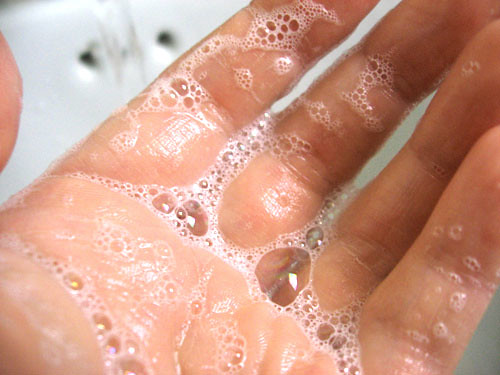Triclosan is a chlorinated organic compound known for its antibacterial and antifungal properties, and is used widely in consumer products such as soaps, detergents and toothpastes. Interestingly, it is approved and registered by the U.S Environmental and Protection Agency as a pesticide. Of late, its widespread use in consumer products has caused serious health concerns and controversy.
Mechanism of action

Triclosan exerts bactericidal properties at larger doses while it acts as a bacteriostatic agent at relatively smaller doses. Biochemically, it acts by binding to bacterial enzyme, enoyl-acyl carrier protein reductase, which increases its affinity for nicotinamide adenine dinucleotide (NAD), thereby making a complex with triclosan. This complex incapacitates the bacterial potential to synthesize fatty acids crucial for the formation of cell membrane.
Use as an antimicrobial agent
In 1972, triclosan was introduced in the healthcare setting as an antiseptic agent, in the form of scrubs and hand washes. Since then, it has gained much fame and is widely being used in many consumer products. Soaps, lotions, hand sanitizers, shampoos, toothpastes and deodorants are among the most frequently utilized items which often contain the label “antibacterial agent”.
Many companies claim that their product can help guard against potentially life threatening bacteria, methicillin-resistant staphylococcus aureus (MRSA). However, Edward Cox and Deborah Autor, of the Drug Evaluation and Research department of the Food and Drug Regulatory Authority (FDA), warn consumers against unproven claims. The research at FDA in fact invalidates the MRSA claim.
 Many consumer companies also market their triclosan-containing products as being antimicrobial and thus more powerful than non-triclosan products. Colleen Rogers, one of the lead microbiologists at the FDA, disapproves this claim that antibacterial soaps hold any superiority over the conventional soaps or even plain water.
Many consumer companies also market their triclosan-containing products as being antimicrobial and thus more powerful than non-triclosan products. Colleen Rogers, one of the lead microbiologists at the FDA, disapproves this claim that antibacterial soaps hold any superiority over the conventional soaps or even plain water.
Effects on the endocrine system
On a long term basis, research suggests that triclosan may have harmful effects on the endocrine system of humans and wildlife animals. One of the studies indicates that a species of Japanese fish, exposed to triclosan, shows developmental and reproductive changes similar to androgenic effects.
A strong body of evidence coming through laboratory and animal studies raised serious concerns to the EPA. The EPA has since then formulated an Endocrine Disruptor Screening Program to investigate the potential detrimental effects that certain chemicals might have on the human endocrine system. Around 800-1000 chemicals have been recognized to exert their role in disrupting the endocrine system, and triclosan is one such chemical.
Though there have not been any head-to-head trials to observe the toxigenic effects of triclosan in the modulating the endocrine system, a large population has already shown a trend towards selecting more natural products. Evidence for this comes from the loss which a major toothpaste brand had to suffer in market share last year.
Triclosan and oral hygiene
When it came to maintenance of dental hygiene, this toothpaste from a major toothpaste brand was celebrated as an unparalleled product amongst various toothpastes. The toothpaste contained triclosan as a major ingredient. A large number of studies by dental researchers ascertained the beneficial impact of triclosan in preventing gingivitis and periodontal disease. Almost half of the Americans above age 30 are afflicted by periodontal disease resulting from gingivitis, the Centers for Disease Control and Prevention indicated. Thus, this toothpaste was heralded as the gold standard in preventing periodontal disease.
However, in the last year, several studies indicating triclosan’s adverse effects were released and this topic received enormous media coverage. Due to this, the toothpaste brand suffered in the marketplace and sales dropped to an all-time low. Despite the looming controversies, a review in 2013 by the Cochrane Oral Health Group stressed that there is no compelling evidence suggesting toxic effects of this toothpaste.
The Triclosan controversy is far from over, and should see many reports and studies coming out in the months to come. Before prescribing or buying a triclosan-containing product, it is wise conduct thorough research and come to an informed decision.
Disclaimer: This website is not intended to provide any medical advice. By engaging in a general discussion about medical topics, we hope to raise awareness and provide visibility to issues of medical interest. Doctors must conduct further research for a more informed opinion and should not rely solely on any advice or information provided on this website.
Comments